Hospitality Industry: Needs, Issues, Work Ethics, and Development
VerifiedAdded on 2021/04/17
|27
|7284
|31
Report
AI Summary
This report delves into the needs and issues within the hospitality industry, specifically examining work ethics, personal, and career development. It begins with an abstract and table of contents, followed by an introduction highlighting the significance of ethical behavior and its impact on customer satisfaction and career progression. The report then provides a comprehensive literature review, analyzing various articles related to job satisfaction, workplace relationships, mentoring, revenue management, talent management, and ethical climates within the hospitality sector. The review explores the gaps in existing research and identifies the research question, methods, and design used in the studies. The discussion and conclusion sections summarize the findings, while the research proposal outlines potential areas for future investigation. The report emphasizes the importance of ethical decision-making, employee skills, and the impact of factors such as work-life balance and psychological capital on employee satisfaction and career success. It also addresses the challenges of career decision-making, ethical dilemmas, and sustainable human resource management within the hospitality industry, offering valuable insights for professionals and academics alike.
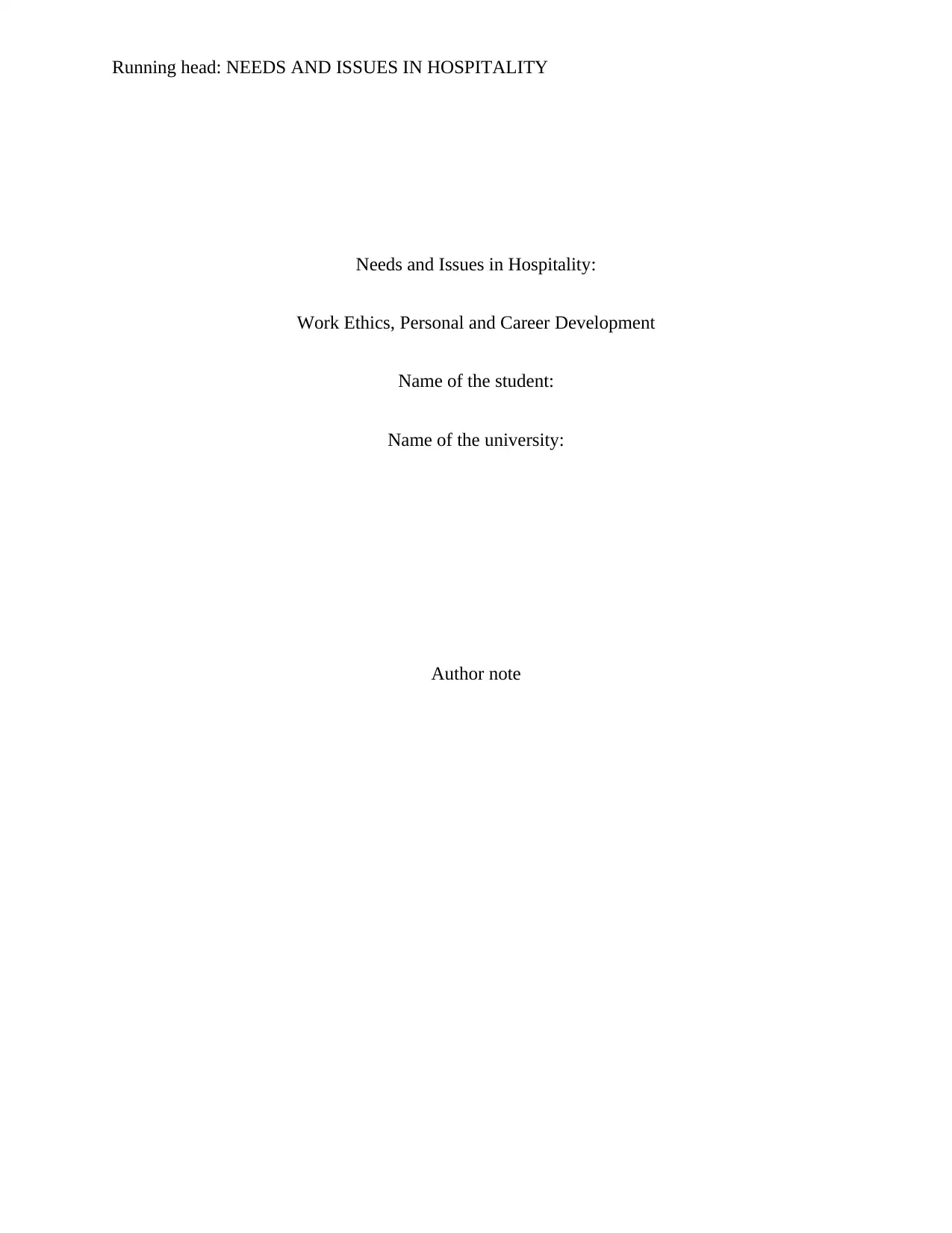
Running head: NEEDS AND ISSUES IN HOSPITALITY
Needs and Issues in Hospitality:
Work Ethics, Personal and Career Development
Name of the student:
Name of the university:
Author note
Needs and Issues in Hospitality:
Work Ethics, Personal and Career Development
Name of the student:
Name of the university:
Author note
Paraphrase This Document
Need a fresh take? Get an instant paraphrase of this document with our AI Paraphraser
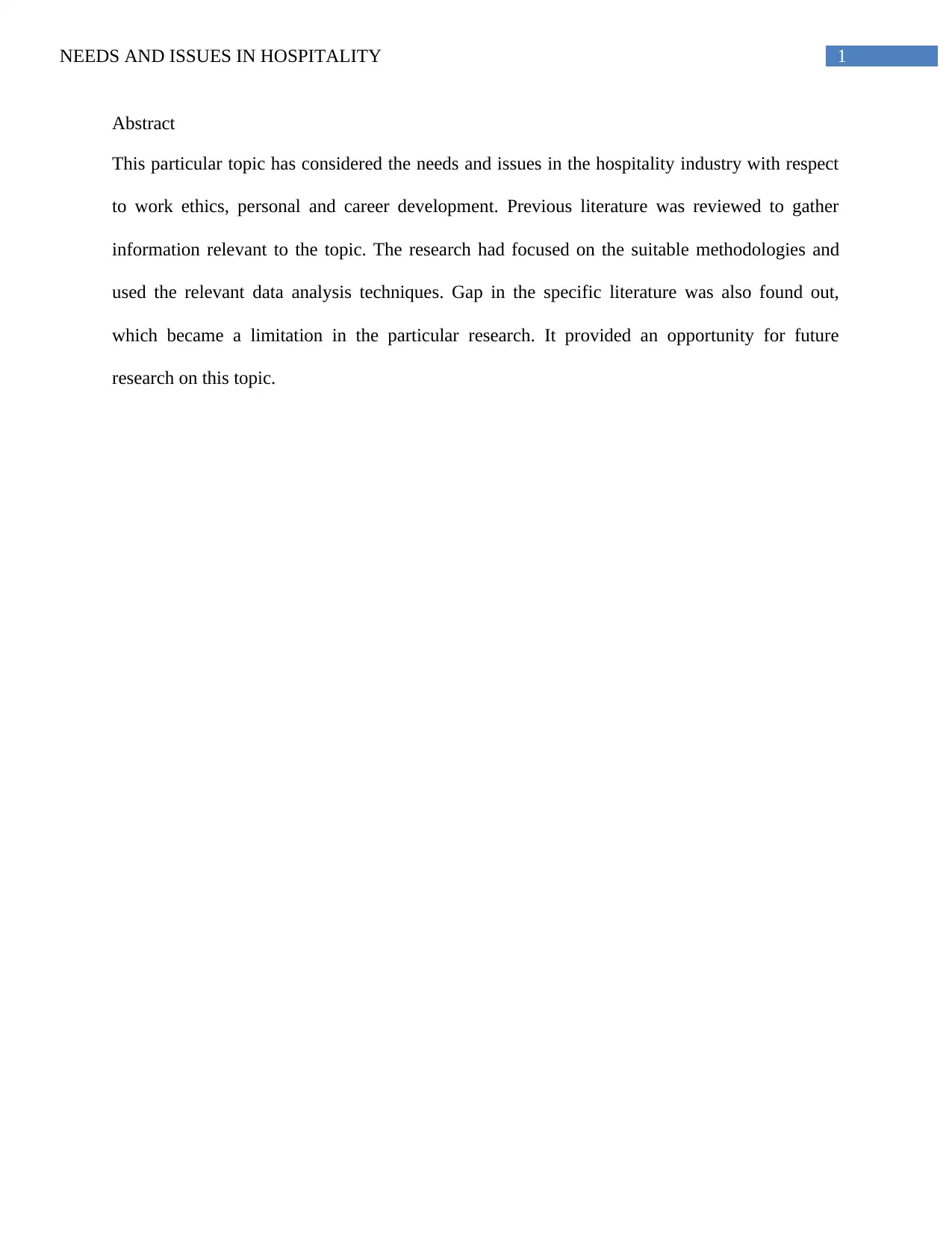
1NEEDS AND ISSUES IN HOSPITALITY
Abstract
This particular topic has considered the needs and issues in the hospitality industry with respect
to work ethics, personal and career development. Previous literature was reviewed to gather
information relevant to the topic. The research had focused on the suitable methodologies and
used the relevant data analysis techniques. Gap in the specific literature was also found out,
which became a limitation in the particular research. It provided an opportunity for future
research on this topic.
Abstract
This particular topic has considered the needs and issues in the hospitality industry with respect
to work ethics, personal and career development. Previous literature was reviewed to gather
information relevant to the topic. The research had focused on the suitable methodologies and
used the relevant data analysis techniques. Gap in the specific literature was also found out,
which became a limitation in the particular research. It provided an opportunity for future
research on this topic.
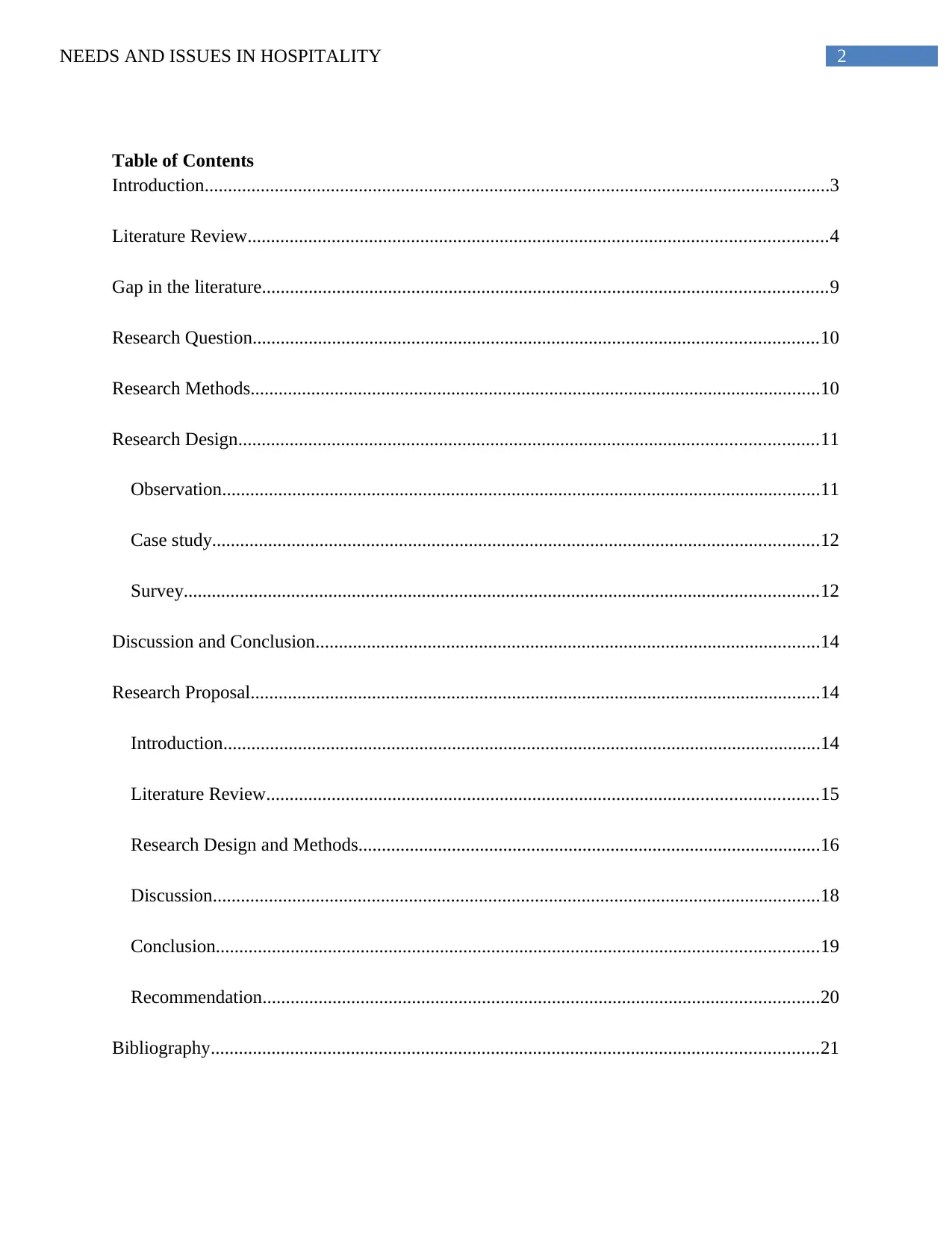
2NEEDS AND ISSUES IN HOSPITALITY
Table of Contents
Introduction......................................................................................................................................3
Literature Review............................................................................................................................4
Gap in the literature.........................................................................................................................9
Research Question.........................................................................................................................10
Research Methods..........................................................................................................................10
Research Design............................................................................................................................11
Observation................................................................................................................................11
Case study..................................................................................................................................12
Survey........................................................................................................................................12
Discussion and Conclusion............................................................................................................14
Research Proposal..........................................................................................................................14
Introduction................................................................................................................................14
Literature Review......................................................................................................................15
Research Design and Methods...................................................................................................16
Discussion..................................................................................................................................18
Conclusion.................................................................................................................................19
Recommendation.......................................................................................................................20
Bibliography..................................................................................................................................21
Table of Contents
Introduction......................................................................................................................................3
Literature Review............................................................................................................................4
Gap in the literature.........................................................................................................................9
Research Question.........................................................................................................................10
Research Methods..........................................................................................................................10
Research Design............................................................................................................................11
Observation................................................................................................................................11
Case study..................................................................................................................................12
Survey........................................................................................................................................12
Discussion and Conclusion............................................................................................................14
Research Proposal..........................................................................................................................14
Introduction................................................................................................................................14
Literature Review......................................................................................................................15
Research Design and Methods...................................................................................................16
Discussion..................................................................................................................................18
Conclusion.................................................................................................................................19
Recommendation.......................................................................................................................20
Bibliography..................................................................................................................................21
⊘ This is a preview!⊘
Do you want full access?
Subscribe today to unlock all pages.

Trusted by 1+ million students worldwide
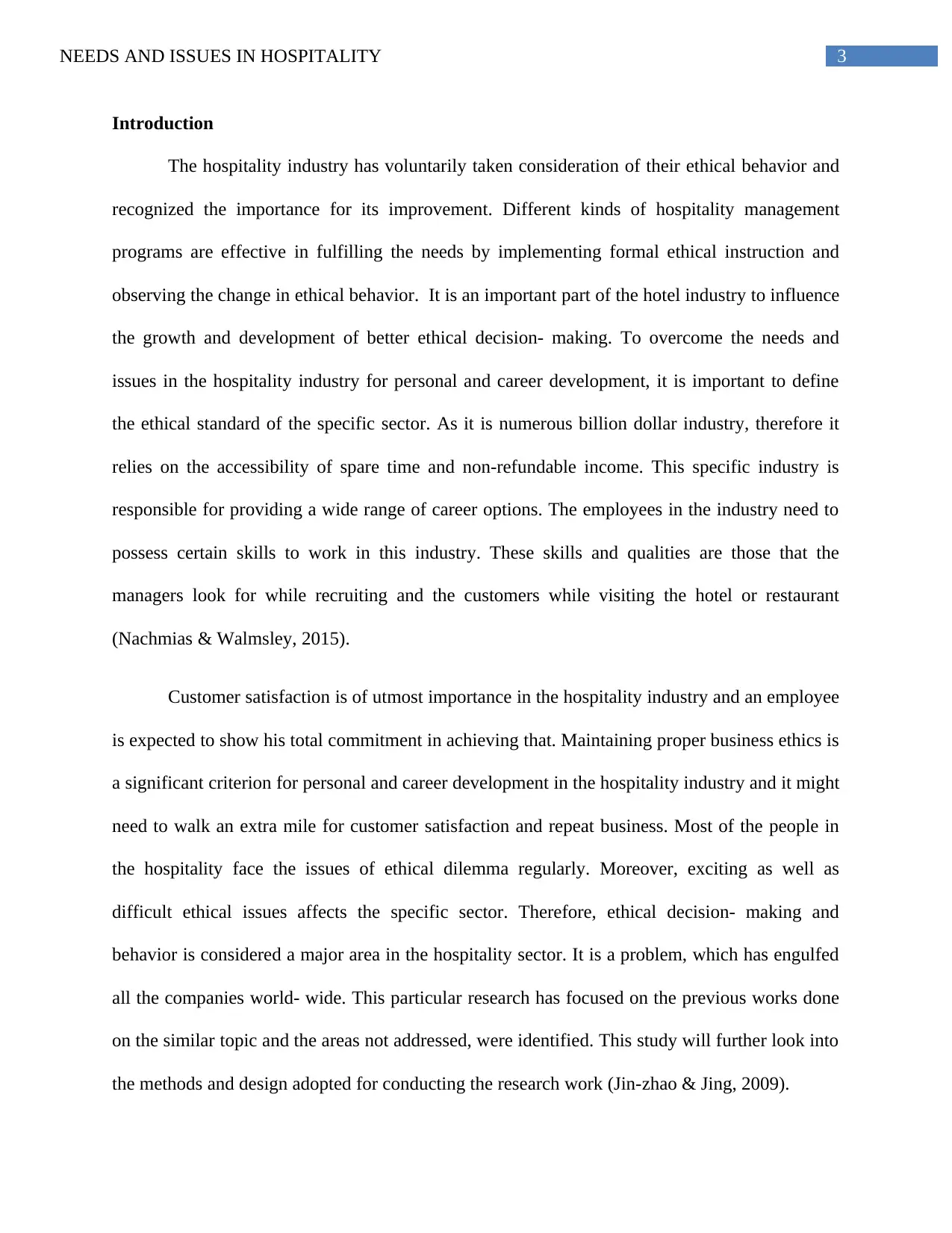
3NEEDS AND ISSUES IN HOSPITALITY
Introduction
The hospitality industry has voluntarily taken consideration of their ethical behavior and
recognized the importance for its improvement. Different kinds of hospitality management
programs are effective in fulfilling the needs by implementing formal ethical instruction and
observing the change in ethical behavior. It is an important part of the hotel industry to influence
the growth and development of better ethical decision- making. To overcome the needs and
issues in the hospitality industry for personal and career development, it is important to define
the ethical standard of the specific sector. As it is numerous billion dollar industry, therefore it
relies on the accessibility of spare time and non-refundable income. This specific industry is
responsible for providing a wide range of career options. The employees in the industry need to
possess certain skills to work in this industry. These skills and qualities are those that the
managers look for while recruiting and the customers while visiting the hotel or restaurant
(Nachmias & Walmsley, 2015).
Customer satisfaction is of utmost importance in the hospitality industry and an employee
is expected to show his total commitment in achieving that. Maintaining proper business ethics is
a significant criterion for personal and career development in the hospitality industry and it might
need to walk an extra mile for customer satisfaction and repeat business. Most of the people in
the hospitality face the issues of ethical dilemma regularly. Moreover, exciting as well as
difficult ethical issues affects the specific sector. Therefore, ethical decision- making and
behavior is considered a major area in the hospitality sector. It is a problem, which has engulfed
all the companies world- wide. This particular research has focused on the previous works done
on the similar topic and the areas not addressed, were identified. This study will further look into
the methods and design adopted for conducting the research work (Jin-zhao & Jing, 2009).
Introduction
The hospitality industry has voluntarily taken consideration of their ethical behavior and
recognized the importance for its improvement. Different kinds of hospitality management
programs are effective in fulfilling the needs by implementing formal ethical instruction and
observing the change in ethical behavior. It is an important part of the hotel industry to influence
the growth and development of better ethical decision- making. To overcome the needs and
issues in the hospitality industry for personal and career development, it is important to define
the ethical standard of the specific sector. As it is numerous billion dollar industry, therefore it
relies on the accessibility of spare time and non-refundable income. This specific industry is
responsible for providing a wide range of career options. The employees in the industry need to
possess certain skills to work in this industry. These skills and qualities are those that the
managers look for while recruiting and the customers while visiting the hotel or restaurant
(Nachmias & Walmsley, 2015).
Customer satisfaction is of utmost importance in the hospitality industry and an employee
is expected to show his total commitment in achieving that. Maintaining proper business ethics is
a significant criterion for personal and career development in the hospitality industry and it might
need to walk an extra mile for customer satisfaction and repeat business. Most of the people in
the hospitality face the issues of ethical dilemma regularly. Moreover, exciting as well as
difficult ethical issues affects the specific sector. Therefore, ethical decision- making and
behavior is considered a major area in the hospitality sector. It is a problem, which has engulfed
all the companies world- wide. This particular research has focused on the previous works done
on the similar topic and the areas not addressed, were identified. This study will further look into
the methods and design adopted for conducting the research work (Jin-zhao & Jing, 2009).
Paraphrase This Document
Need a fresh take? Get an instant paraphrase of this document with our AI Paraphraser
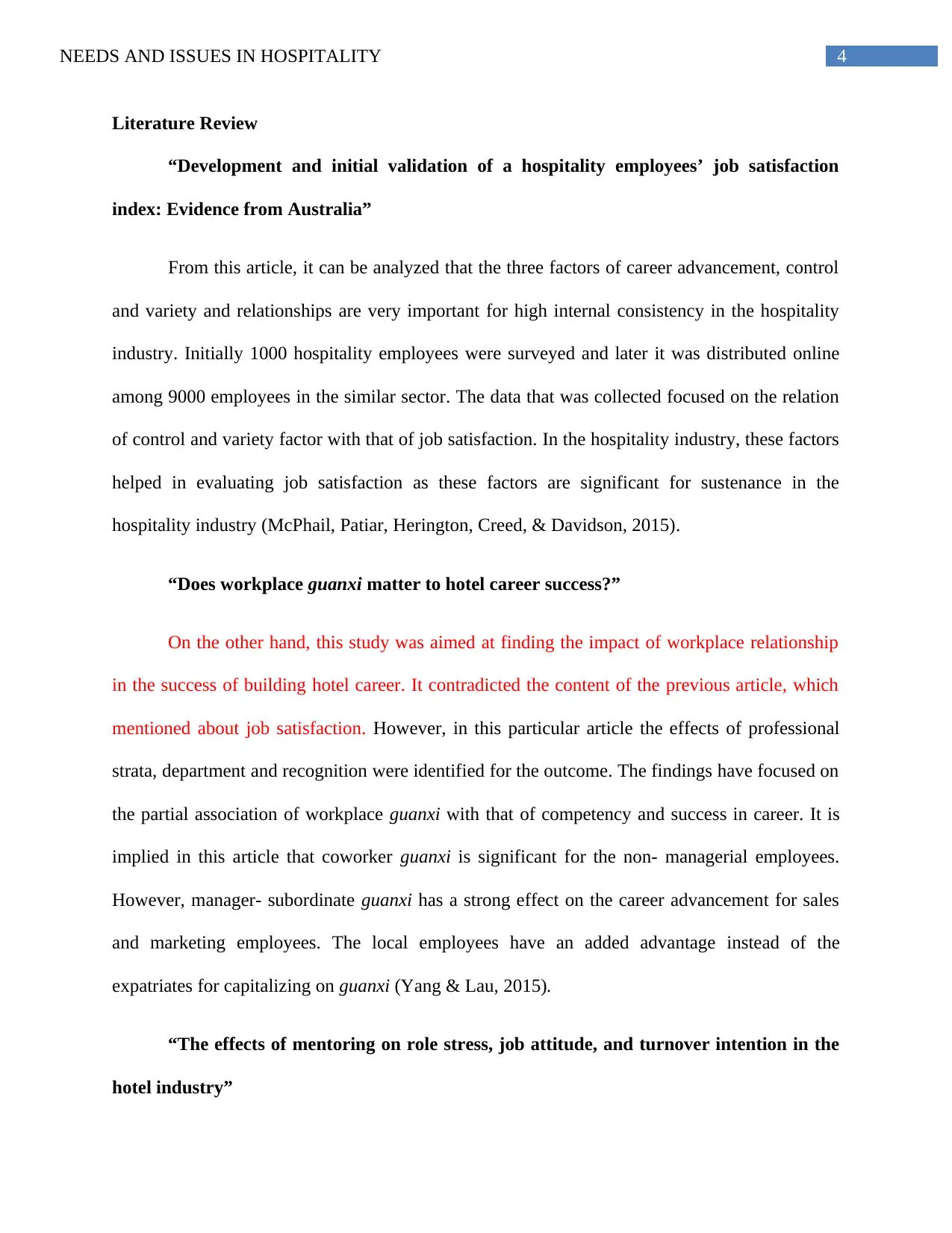
4NEEDS AND ISSUES IN HOSPITALITY
Literature Review
“Development and initial validation of a hospitality employees’ job satisfaction
index: Evidence from Australia”
From this article, it can be analyzed that the three factors of career advancement, control
and variety and relationships are very important for high internal consistency in the hospitality
industry. Initially 1000 hospitality employees were surveyed and later it was distributed online
among 9000 employees in the similar sector. The data that was collected focused on the relation
of control and variety factor with that of job satisfaction. In the hospitality industry, these factors
helped in evaluating job satisfaction as these factors are significant for sustenance in the
hospitality industry (McPhail, Patiar, Herington, Creed, & Davidson, 2015).
“Does workplace guanxi matter to hotel career success?”
On the other hand, this study was aimed at finding the impact of workplace relationship
in the success of building hotel career. It contradicted the content of the previous article, which
mentioned about job satisfaction. However, in this particular article the effects of professional
strata, department and recognition were identified for the outcome. The findings have focused on
the partial association of workplace guanxi with that of competency and success in career. It is
implied in this article that coworker guanxi is significant for the non- managerial employees.
However, manager- subordinate guanxi has a strong effect on the career advancement for sales
and marketing employees. The local employees have an added advantage instead of the
expatriates for capitalizing on guanxi (Yang & Lau, 2015).
“The effects of mentoring on role stress, job attitude, and turnover intention in the
hotel industry”
Literature Review
“Development and initial validation of a hospitality employees’ job satisfaction
index: Evidence from Australia”
From this article, it can be analyzed that the three factors of career advancement, control
and variety and relationships are very important for high internal consistency in the hospitality
industry. Initially 1000 hospitality employees were surveyed and later it was distributed online
among 9000 employees in the similar sector. The data that was collected focused on the relation
of control and variety factor with that of job satisfaction. In the hospitality industry, these factors
helped in evaluating job satisfaction as these factors are significant for sustenance in the
hospitality industry (McPhail, Patiar, Herington, Creed, & Davidson, 2015).
“Does workplace guanxi matter to hotel career success?”
On the other hand, this study was aimed at finding the impact of workplace relationship
in the success of building hotel career. It contradicted the content of the previous article, which
mentioned about job satisfaction. However, in this particular article the effects of professional
strata, department and recognition were identified for the outcome. The findings have focused on
the partial association of workplace guanxi with that of competency and success in career. It is
implied in this article that coworker guanxi is significant for the non- managerial employees.
However, manager- subordinate guanxi has a strong effect on the career advancement for sales
and marketing employees. The local employees have an added advantage instead of the
expatriates for capitalizing on guanxi (Yang & Lau, 2015).
“The effects of mentoring on role stress, job attitude, and turnover intention in the
hotel industry”
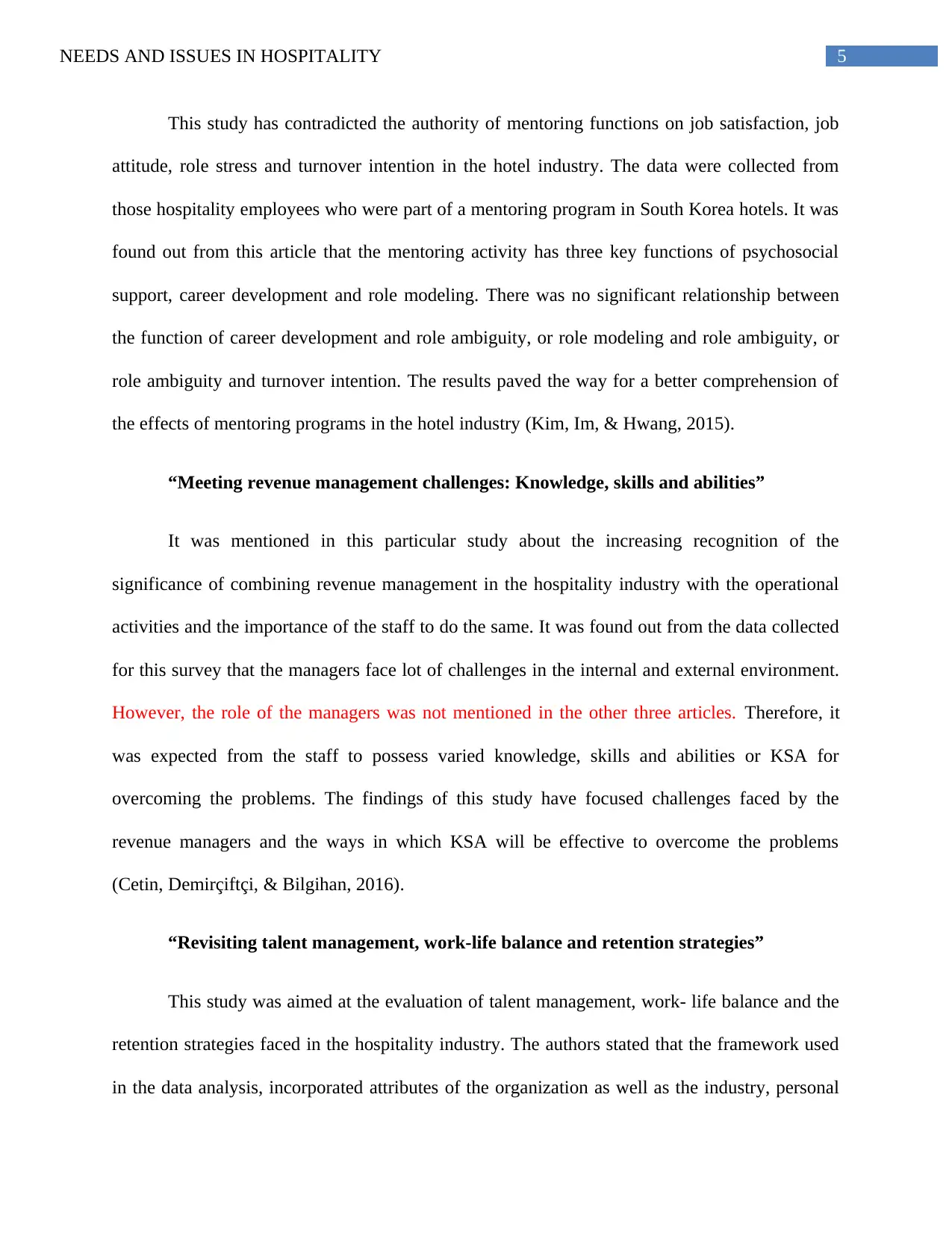
5NEEDS AND ISSUES IN HOSPITALITY
This study has contradicted the authority of mentoring functions on job satisfaction, job
attitude, role stress and turnover intention in the hotel industry. The data were collected from
those hospitality employees who were part of a mentoring program in South Korea hotels. It was
found out from this article that the mentoring activity has three key functions of psychosocial
support, career development and role modeling. There was no significant relationship between
the function of career development and role ambiguity, or role modeling and role ambiguity, or
role ambiguity and turnover intention. The results paved the way for a better comprehension of
the effects of mentoring programs in the hotel industry (Kim, Im, & Hwang, 2015).
“Meeting revenue management challenges: Knowledge, skills and abilities”
It was mentioned in this particular study about the increasing recognition of the
significance of combining revenue management in the hospitality industry with the operational
activities and the importance of the staff to do the same. It was found out from the data collected
for this survey that the managers face lot of challenges in the internal and external environment.
However, the role of the managers was not mentioned in the other three articles. Therefore, it
was expected from the staff to possess varied knowledge, skills and abilities or KSA for
overcoming the problems. The findings of this study have focused challenges faced by the
revenue managers and the ways in which KSA will be effective to overcome the problems
(Cetin, Demirçiftçi, & Bilgihan, 2016).
“Revisiting talent management, work-life balance and retention strategies”
This study was aimed at the evaluation of talent management, work- life balance and the
retention strategies faced in the hospitality industry. The authors stated that the framework used
in the data analysis, incorporated attributes of the organization as well as the industry, personal
This study has contradicted the authority of mentoring functions on job satisfaction, job
attitude, role stress and turnover intention in the hotel industry. The data were collected from
those hospitality employees who were part of a mentoring program in South Korea hotels. It was
found out from this article that the mentoring activity has three key functions of psychosocial
support, career development and role modeling. There was no significant relationship between
the function of career development and role ambiguity, or role modeling and role ambiguity, or
role ambiguity and turnover intention. The results paved the way for a better comprehension of
the effects of mentoring programs in the hotel industry (Kim, Im, & Hwang, 2015).
“Meeting revenue management challenges: Knowledge, skills and abilities”
It was mentioned in this particular study about the increasing recognition of the
significance of combining revenue management in the hospitality industry with the operational
activities and the importance of the staff to do the same. It was found out from the data collected
for this survey that the managers face lot of challenges in the internal and external environment.
However, the role of the managers was not mentioned in the other three articles. Therefore, it
was expected from the staff to possess varied knowledge, skills and abilities or KSA for
overcoming the problems. The findings of this study have focused challenges faced by the
revenue managers and the ways in which KSA will be effective to overcome the problems
(Cetin, Demirçiftçi, & Bilgihan, 2016).
“Revisiting talent management, work-life balance and retention strategies”
This study was aimed at the evaluation of talent management, work- life balance and the
retention strategies faced in the hospitality industry. The authors stated that the framework used
in the data analysis, incorporated attributes of the organization as well as the industry, personal
⊘ This is a preview!⊘
Do you want full access?
Subscribe today to unlock all pages.

Trusted by 1+ million students worldwide
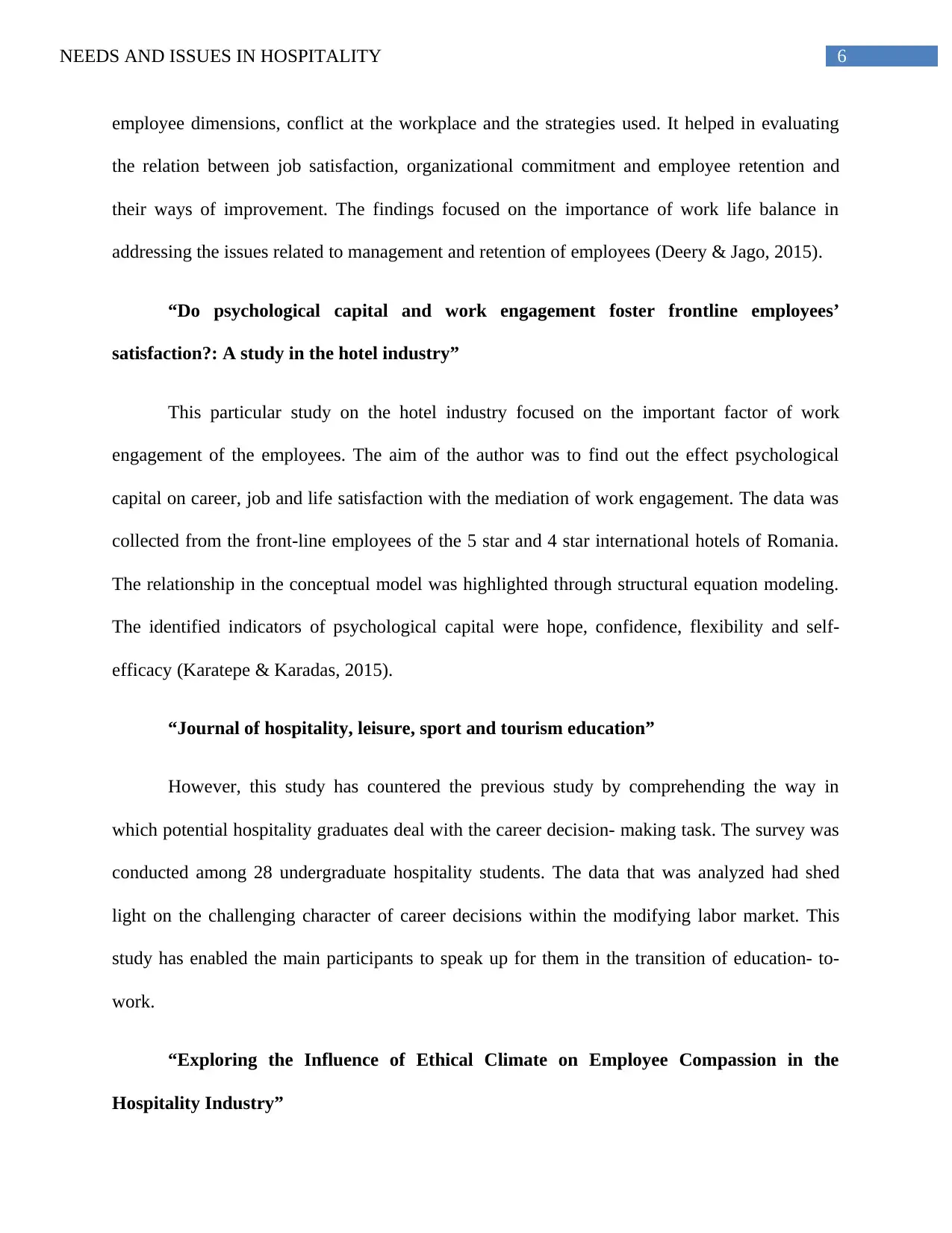
6NEEDS AND ISSUES IN HOSPITALITY
employee dimensions, conflict at the workplace and the strategies used. It helped in evaluating
the relation between job satisfaction, organizational commitment and employee retention and
their ways of improvement. The findings focused on the importance of work life balance in
addressing the issues related to management and retention of employees (Deery & Jago, 2015).
“Do psychological capital and work engagement foster frontline employees’
satisfaction?: A study in the hotel industry”
This particular study on the hotel industry focused on the important factor of work
engagement of the employees. The aim of the author was to find out the effect psychological
capital on career, job and life satisfaction with the mediation of work engagement. The data was
collected from the front-line employees of the 5 star and 4 star international hotels of Romania.
The relationship in the conceptual model was highlighted through structural equation modeling.
The identified indicators of psychological capital were hope, confidence, flexibility and self-
efficacy (Karatepe & Karadas, 2015).
“Journal of hospitality, leisure, sport and tourism education”
However, this study has countered the previous study by comprehending the way in
which potential hospitality graduates deal with the career decision- making task. The survey was
conducted among 28 undergraduate hospitality students. The data that was analyzed had shed
light on the challenging character of career decisions within the modifying labor market. This
study has enabled the main participants to speak up for them in the transition of education- to-
work.
“Exploring the Influence of Ethical Climate on Employee Compassion in the
Hospitality Industry”
employee dimensions, conflict at the workplace and the strategies used. It helped in evaluating
the relation between job satisfaction, organizational commitment and employee retention and
their ways of improvement. The findings focused on the importance of work life balance in
addressing the issues related to management and retention of employees (Deery & Jago, 2015).
“Do psychological capital and work engagement foster frontline employees’
satisfaction?: A study in the hotel industry”
This particular study on the hotel industry focused on the important factor of work
engagement of the employees. The aim of the author was to find out the effect psychological
capital on career, job and life satisfaction with the mediation of work engagement. The data was
collected from the front-line employees of the 5 star and 4 star international hotels of Romania.
The relationship in the conceptual model was highlighted through structural equation modeling.
The identified indicators of psychological capital were hope, confidence, flexibility and self-
efficacy (Karatepe & Karadas, 2015).
“Journal of hospitality, leisure, sport and tourism education”
However, this study has countered the previous study by comprehending the way in
which potential hospitality graduates deal with the career decision- making task. The survey was
conducted among 28 undergraduate hospitality students. The data that was analyzed had shed
light on the challenging character of career decisions within the modifying labor market. This
study has enabled the main participants to speak up for them in the transition of education- to-
work.
“Exploring the Influence of Ethical Climate on Employee Compassion in the
Hospitality Industry”
Paraphrase This Document
Need a fresh take? Get an instant paraphrase of this document with our AI Paraphraser
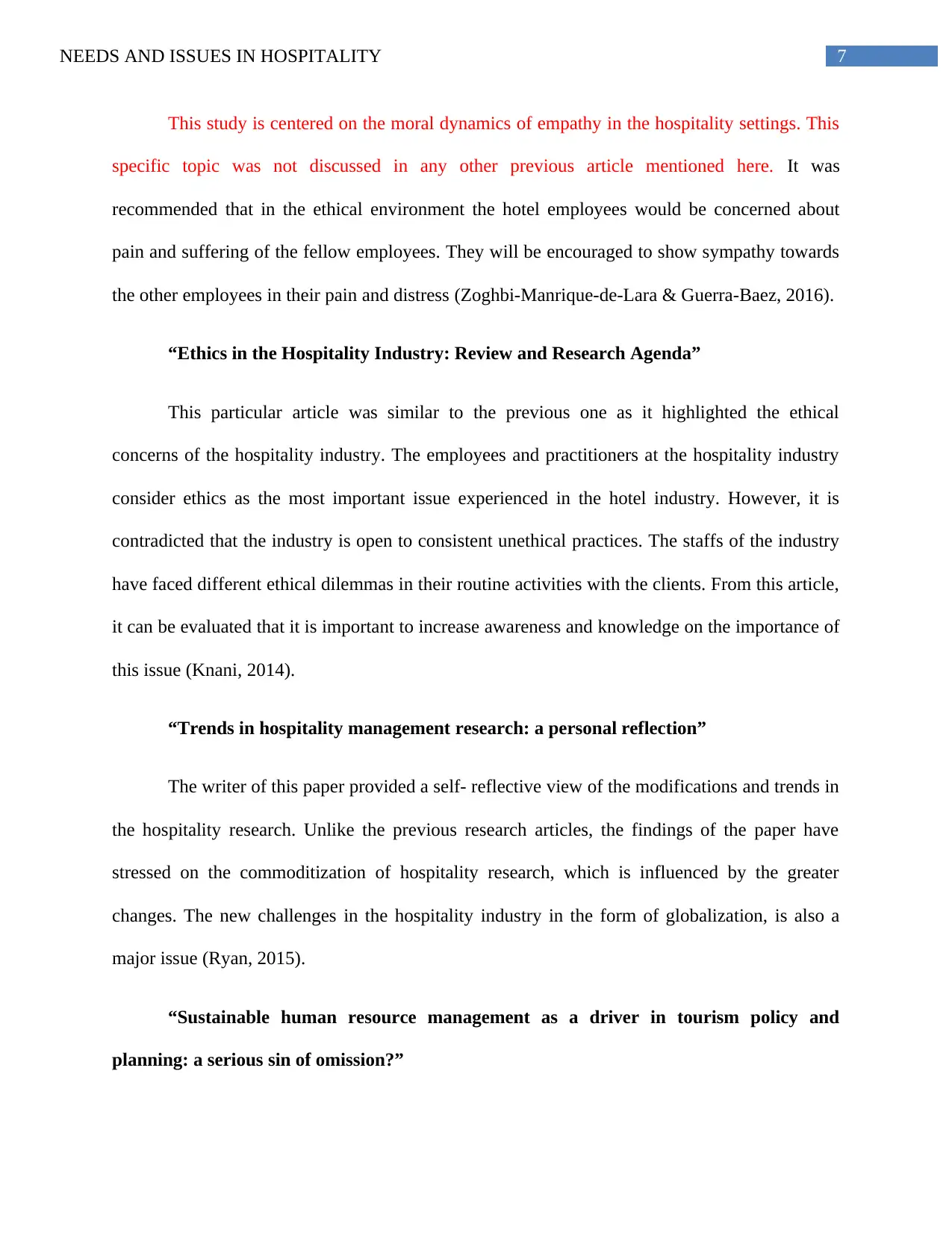
7NEEDS AND ISSUES IN HOSPITALITY
This study is centered on the moral dynamics of empathy in the hospitality settings. This
specific topic was not discussed in any other previous article mentioned here. It was
recommended that in the ethical environment the hotel employees would be concerned about
pain and suffering of the fellow employees. They will be encouraged to show sympathy towards
the other employees in their pain and distress (Zoghbi-Manrique-de-Lara & Guerra-Baez, 2016).
“Ethics in the Hospitality Industry: Review and Research Agenda”
This particular article was similar to the previous one as it highlighted the ethical
concerns of the hospitality industry. The employees and practitioners at the hospitality industry
consider ethics as the most important issue experienced in the hotel industry. However, it is
contradicted that the industry is open to consistent unethical practices. The staffs of the industry
have faced different ethical dilemmas in their routine activities with the clients. From this article,
it can be evaluated that it is important to increase awareness and knowledge on the importance of
this issue (Knani, 2014).
“Trends in hospitality management research: a personal reflection”
The writer of this paper provided a self- reflective view of the modifications and trends in
the hospitality research. Unlike the previous research articles, the findings of the paper have
stressed on the commoditization of hospitality research, which is influenced by the greater
changes. The new challenges in the hospitality industry in the form of globalization, is also a
major issue (Ryan, 2015).
“Sustainable human resource management as a driver in tourism policy and
planning: a serious sin of omission?”
This study is centered on the moral dynamics of empathy in the hospitality settings. This
specific topic was not discussed in any other previous article mentioned here. It was
recommended that in the ethical environment the hotel employees would be concerned about
pain and suffering of the fellow employees. They will be encouraged to show sympathy towards
the other employees in their pain and distress (Zoghbi-Manrique-de-Lara & Guerra-Baez, 2016).
“Ethics in the Hospitality Industry: Review and Research Agenda”
This particular article was similar to the previous one as it highlighted the ethical
concerns of the hospitality industry. The employees and practitioners at the hospitality industry
consider ethics as the most important issue experienced in the hotel industry. However, it is
contradicted that the industry is open to consistent unethical practices. The staffs of the industry
have faced different ethical dilemmas in their routine activities with the clients. From this article,
it can be evaluated that it is important to increase awareness and knowledge on the importance of
this issue (Knani, 2014).
“Trends in hospitality management research: a personal reflection”
The writer of this paper provided a self- reflective view of the modifications and trends in
the hospitality research. Unlike the previous research articles, the findings of the paper have
stressed on the commoditization of hospitality research, which is influenced by the greater
changes. The new challenges in the hospitality industry in the form of globalization, is also a
major issue (Ryan, 2015).
“Sustainable human resource management as a driver in tourism policy and
planning: a serious sin of omission?”
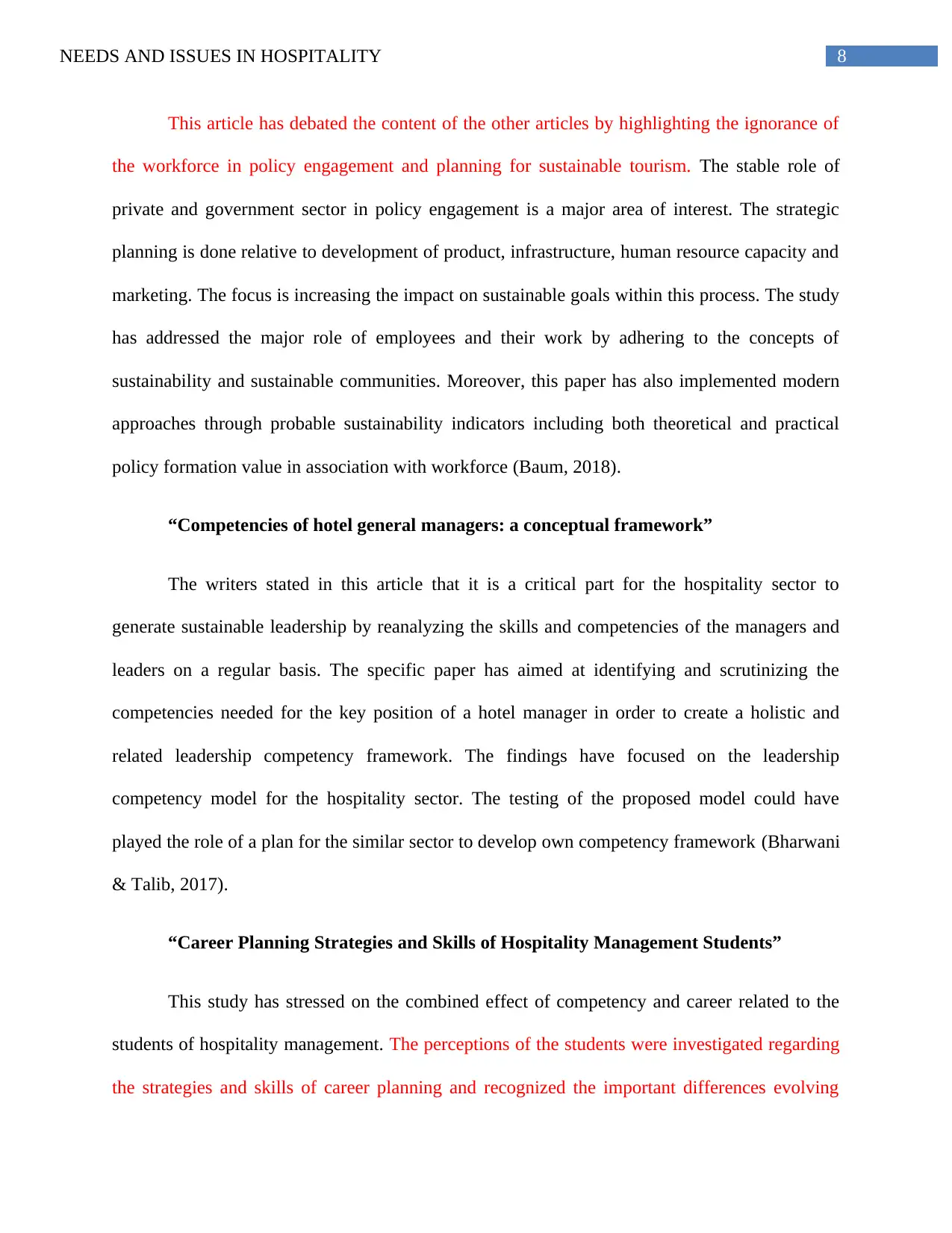
8NEEDS AND ISSUES IN HOSPITALITY
This article has debated the content of the other articles by highlighting the ignorance of
the workforce in policy engagement and planning for sustainable tourism. The stable role of
private and government sector in policy engagement is a major area of interest. The strategic
planning is done relative to development of product, infrastructure, human resource capacity and
marketing. The focus is increasing the impact on sustainable goals within this process. The study
has addressed the major role of employees and their work by adhering to the concepts of
sustainability and sustainable communities. Moreover, this paper has also implemented modern
approaches through probable sustainability indicators including both theoretical and practical
policy formation value in association with workforce (Baum, 2018).
“Competencies of hotel general managers: a conceptual framework”
The writers stated in this article that it is a critical part for the hospitality sector to
generate sustainable leadership by reanalyzing the skills and competencies of the managers and
leaders on a regular basis. The specific paper has aimed at identifying and scrutinizing the
competencies needed for the key position of a hotel manager in order to create a holistic and
related leadership competency framework. The findings have focused on the leadership
competency model for the hospitality sector. The testing of the proposed model could have
played the role of a plan for the similar sector to develop own competency framework (Bharwani
& Talib, 2017).
“Career Planning Strategies and Skills of Hospitality Management Students”
This study has stressed on the combined effect of competency and career related to the
students of hospitality management. The perceptions of the students were investigated regarding
the strategies and skills of career planning and recognized the important differences evolving
This article has debated the content of the other articles by highlighting the ignorance of
the workforce in policy engagement and planning for sustainable tourism. The stable role of
private and government sector in policy engagement is a major area of interest. The strategic
planning is done relative to development of product, infrastructure, human resource capacity and
marketing. The focus is increasing the impact on sustainable goals within this process. The study
has addressed the major role of employees and their work by adhering to the concepts of
sustainability and sustainable communities. Moreover, this paper has also implemented modern
approaches through probable sustainability indicators including both theoretical and practical
policy formation value in association with workforce (Baum, 2018).
“Competencies of hotel general managers: a conceptual framework”
The writers stated in this article that it is a critical part for the hospitality sector to
generate sustainable leadership by reanalyzing the skills and competencies of the managers and
leaders on a regular basis. The specific paper has aimed at identifying and scrutinizing the
competencies needed for the key position of a hotel manager in order to create a holistic and
related leadership competency framework. The findings have focused on the leadership
competency model for the hospitality sector. The testing of the proposed model could have
played the role of a plan for the similar sector to develop own competency framework (Bharwani
& Talib, 2017).
“Career Planning Strategies and Skills of Hospitality Management Students”
This study has stressed on the combined effect of competency and career related to the
students of hospitality management. The perceptions of the students were investigated regarding
the strategies and skills of career planning and recognized the important differences evolving
⊘ This is a preview!⊘
Do you want full access?
Subscribe today to unlock all pages.

Trusted by 1+ million students worldwide
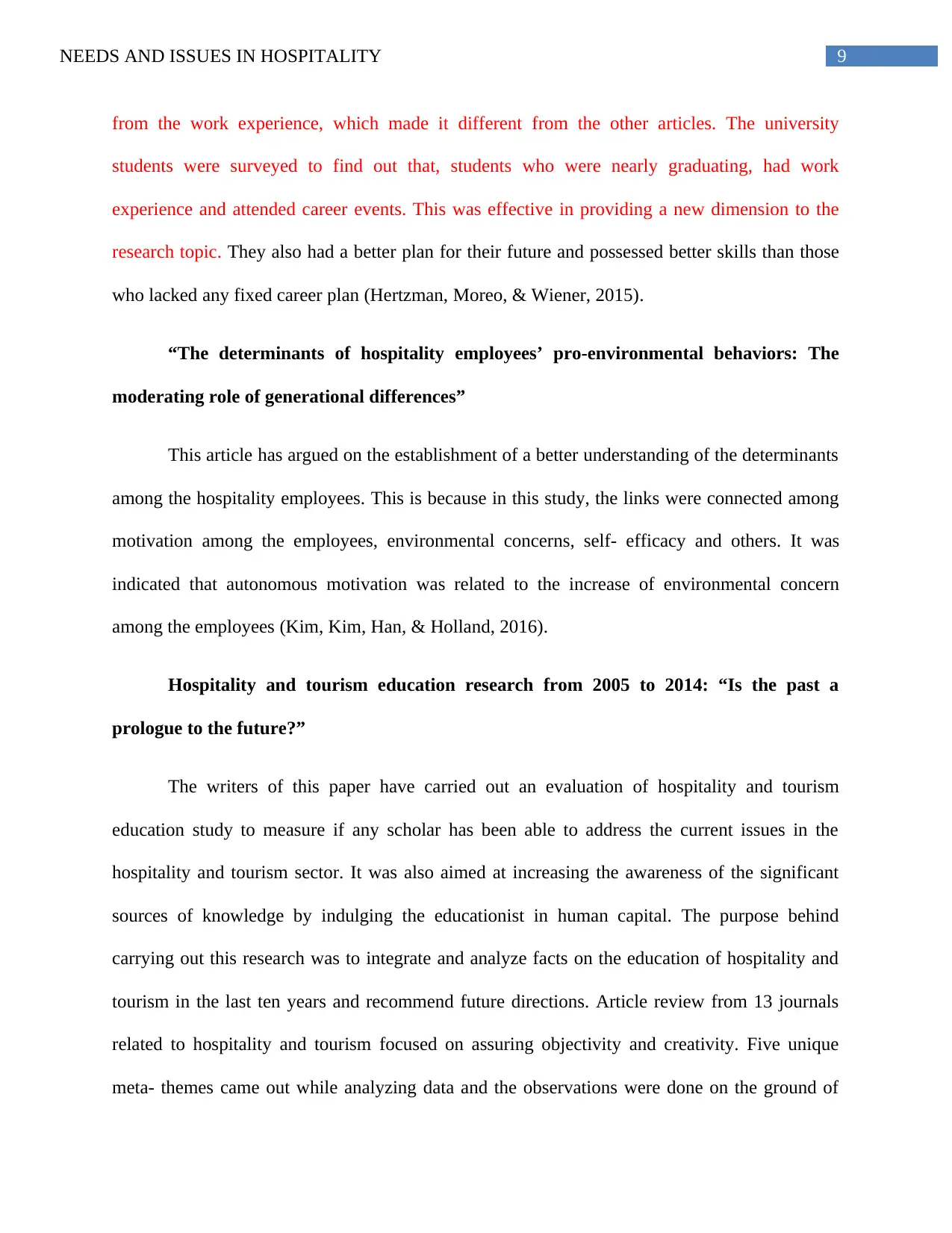
9NEEDS AND ISSUES IN HOSPITALITY
from the work experience, which made it different from the other articles. The university
students were surveyed to find out that, students who were nearly graduating, had work
experience and attended career events. This was effective in providing a new dimension to the
research topic. They also had a better plan for their future and possessed better skills than those
who lacked any fixed career plan (Hertzman, Moreo, & Wiener, 2015).
“The determinants of hospitality employees’ pro-environmental behaviors: The
moderating role of generational differences”
This article has argued on the establishment of a better understanding of the determinants
among the hospitality employees. This is because in this study, the links were connected among
motivation among the employees, environmental concerns, self- efficacy and others. It was
indicated that autonomous motivation was related to the increase of environmental concern
among the employees (Kim, Kim, Han, & Holland, 2016).
Hospitality and tourism education research from 2005 to 2014: “Is the past a
prologue to the future?”
The writers of this paper have carried out an evaluation of hospitality and tourism
education study to measure if any scholar has been able to address the current issues in the
hospitality and tourism sector. It was also aimed at increasing the awareness of the significant
sources of knowledge by indulging the educationist in human capital. The purpose behind
carrying out this research was to integrate and analyze facts on the education of hospitality and
tourism in the last ten years and recommend future directions. Article review from 13 journals
related to hospitality and tourism focused on assuring objectivity and creativity. Five unique
meta- themes came out while analyzing data and the observations were done on the ground of
from the work experience, which made it different from the other articles. The university
students were surveyed to find out that, students who were nearly graduating, had work
experience and attended career events. This was effective in providing a new dimension to the
research topic. They also had a better plan for their future and possessed better skills than those
who lacked any fixed career plan (Hertzman, Moreo, & Wiener, 2015).
“The determinants of hospitality employees’ pro-environmental behaviors: The
moderating role of generational differences”
This article has argued on the establishment of a better understanding of the determinants
among the hospitality employees. This is because in this study, the links were connected among
motivation among the employees, environmental concerns, self- efficacy and others. It was
indicated that autonomous motivation was related to the increase of environmental concern
among the employees (Kim, Kim, Han, & Holland, 2016).
Hospitality and tourism education research from 2005 to 2014: “Is the past a
prologue to the future?”
The writers of this paper have carried out an evaluation of hospitality and tourism
education study to measure if any scholar has been able to address the current issues in the
hospitality and tourism sector. It was also aimed at increasing the awareness of the significant
sources of knowledge by indulging the educationist in human capital. The purpose behind
carrying out this research was to integrate and analyze facts on the education of hospitality and
tourism in the last ten years and recommend future directions. Article review from 13 journals
related to hospitality and tourism focused on assuring objectivity and creativity. Five unique
meta- themes came out while analyzing data and the observations were done on the ground of
Paraphrase This Document
Need a fresh take? Get an instant paraphrase of this document with our AI Paraphraser
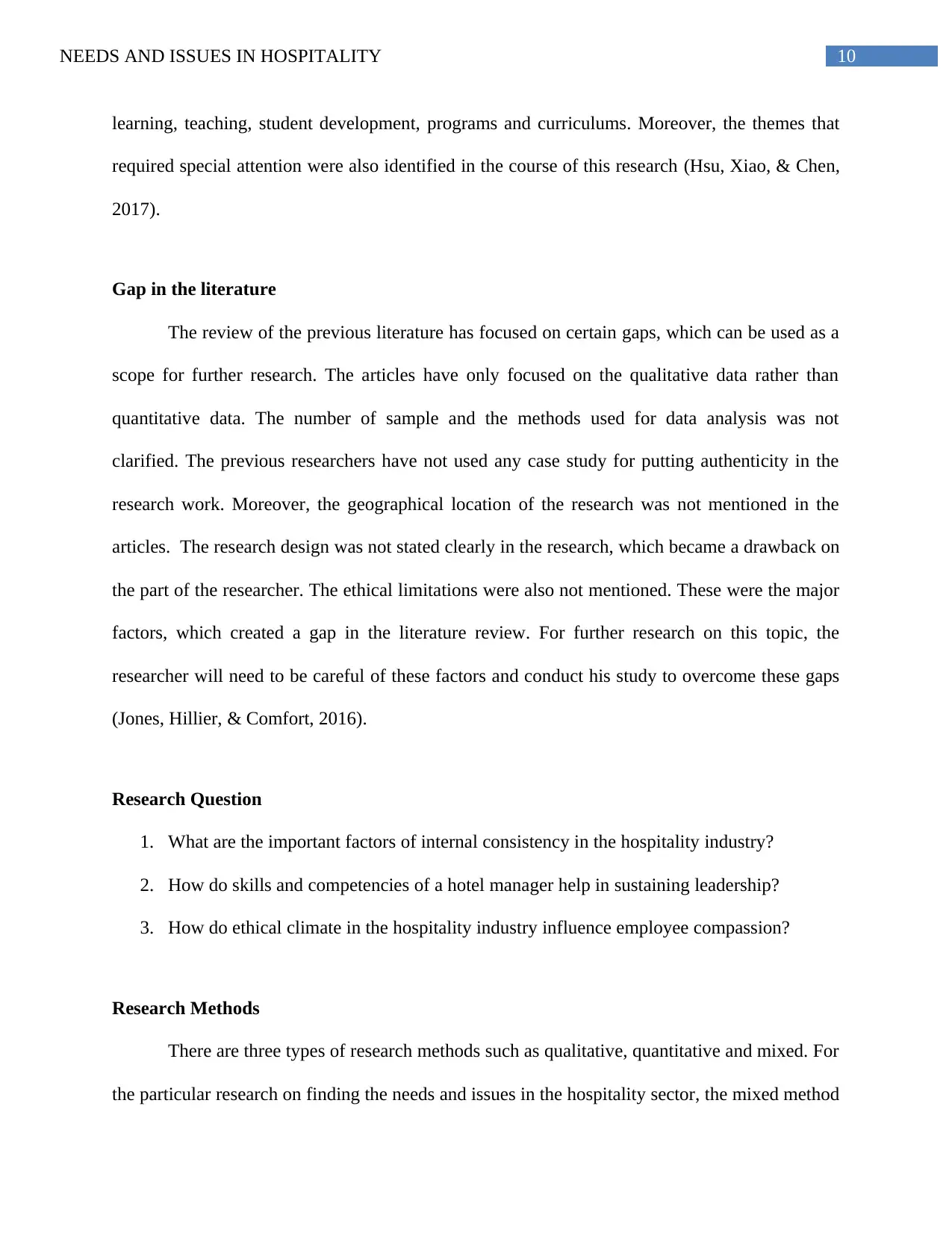
10NEEDS AND ISSUES IN HOSPITALITY
learning, teaching, student development, programs and curriculums. Moreover, the themes that
required special attention were also identified in the course of this research (Hsu, Xiao, & Chen,
2017).
Gap in the literature
The review of the previous literature has focused on certain gaps, which can be used as a
scope for further research. The articles have only focused on the qualitative data rather than
quantitative data. The number of sample and the methods used for data analysis was not
clarified. The previous researchers have not used any case study for putting authenticity in the
research work. Moreover, the geographical location of the research was not mentioned in the
articles. The research design was not stated clearly in the research, which became a drawback on
the part of the researcher. The ethical limitations were also not mentioned. These were the major
factors, which created a gap in the literature review. For further research on this topic, the
researcher will need to be careful of these factors and conduct his study to overcome these gaps
(Jones, Hillier, & Comfort, 2016).
Research Question
1. What are the important factors of internal consistency in the hospitality industry?
2. How do skills and competencies of a hotel manager help in sustaining leadership?
3. How do ethical climate in the hospitality industry influence employee compassion?
Research Methods
There are three types of research methods such as qualitative, quantitative and mixed. For
the particular research on finding the needs and issues in the hospitality sector, the mixed method
learning, teaching, student development, programs and curriculums. Moreover, the themes that
required special attention were also identified in the course of this research (Hsu, Xiao, & Chen,
2017).
Gap in the literature
The review of the previous literature has focused on certain gaps, which can be used as a
scope for further research. The articles have only focused on the qualitative data rather than
quantitative data. The number of sample and the methods used for data analysis was not
clarified. The previous researchers have not used any case study for putting authenticity in the
research work. Moreover, the geographical location of the research was not mentioned in the
articles. The research design was not stated clearly in the research, which became a drawback on
the part of the researcher. The ethical limitations were also not mentioned. These were the major
factors, which created a gap in the literature review. For further research on this topic, the
researcher will need to be careful of these factors and conduct his study to overcome these gaps
(Jones, Hillier, & Comfort, 2016).
Research Question
1. What are the important factors of internal consistency in the hospitality industry?
2. How do skills and competencies of a hotel manager help in sustaining leadership?
3. How do ethical climate in the hospitality industry influence employee compassion?
Research Methods
There are three types of research methods such as qualitative, quantitative and mixed. For
the particular research on finding the needs and issues in the hospitality sector, the mixed method
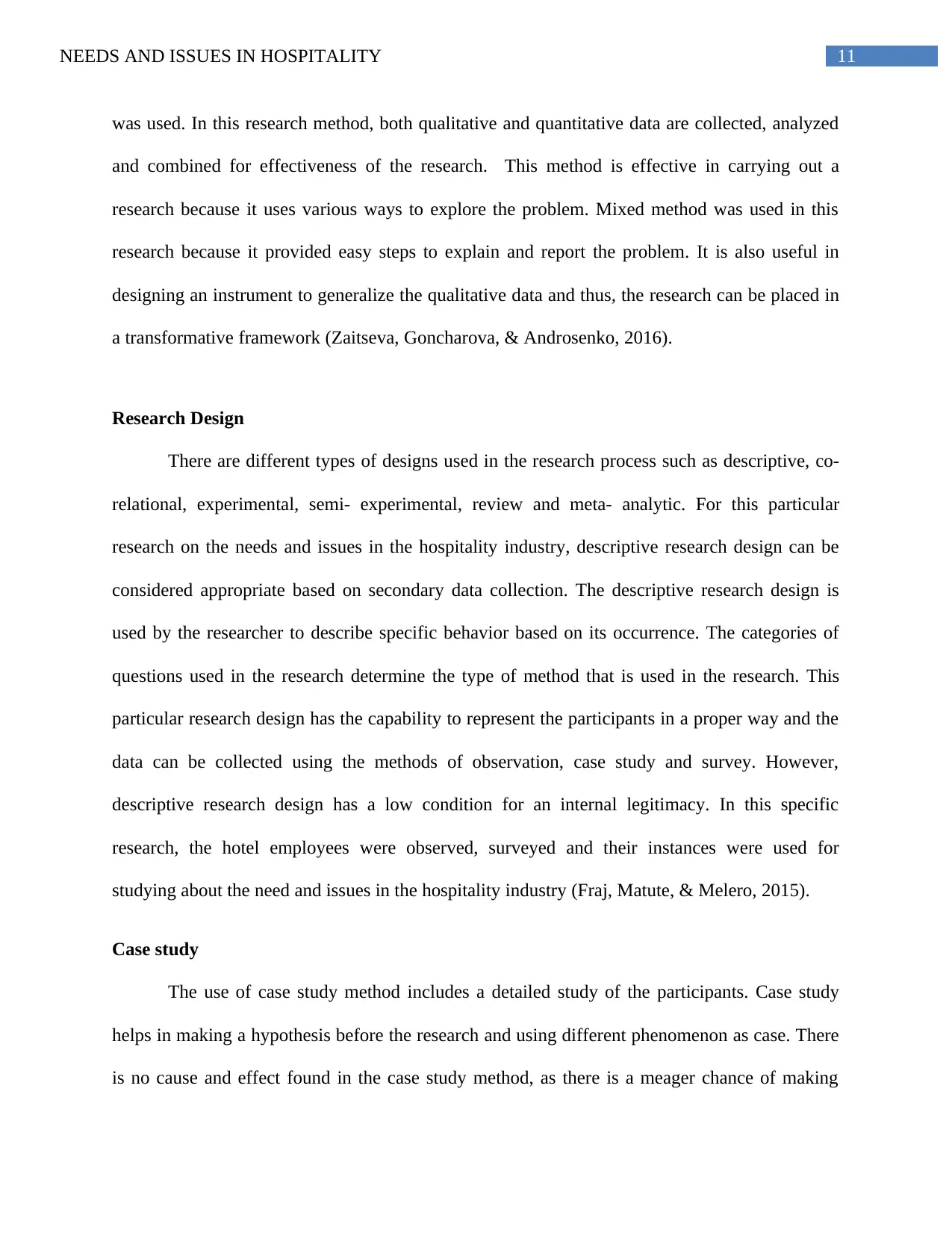
11NEEDS AND ISSUES IN HOSPITALITY
was used. In this research method, both qualitative and quantitative data are collected, analyzed
and combined for effectiveness of the research. This method is effective in carrying out a
research because it uses various ways to explore the problem. Mixed method was used in this
research because it provided easy steps to explain and report the problem. It is also useful in
designing an instrument to generalize the qualitative data and thus, the research can be placed in
a transformative framework (Zaitseva, Goncharova, & Androsenko, 2016).
Research Design
There are different types of designs used in the research process such as descriptive, co-
relational, experimental, semi- experimental, review and meta- analytic. For this particular
research on the needs and issues in the hospitality industry, descriptive research design can be
considered appropriate based on secondary data collection. The descriptive research design is
used by the researcher to describe specific behavior based on its occurrence. The categories of
questions used in the research determine the type of method that is used in the research. This
particular research design has the capability to represent the participants in a proper way and the
data can be collected using the methods of observation, case study and survey. However,
descriptive research design has a low condition for an internal legitimacy. In this specific
research, the hotel employees were observed, surveyed and their instances were used for
studying about the need and issues in the hospitality industry (Fraj, Matute, & Melero, 2015).
Case study
The use of case study method includes a detailed study of the participants. Case study
helps in making a hypothesis before the research and using different phenomenon as case. There
is no cause and effect found in the case study method, as there is a meager chance of making
was used. In this research method, both qualitative and quantitative data are collected, analyzed
and combined for effectiveness of the research. This method is effective in carrying out a
research because it uses various ways to explore the problem. Mixed method was used in this
research because it provided easy steps to explain and report the problem. It is also useful in
designing an instrument to generalize the qualitative data and thus, the research can be placed in
a transformative framework (Zaitseva, Goncharova, & Androsenko, 2016).
Research Design
There are different types of designs used in the research process such as descriptive, co-
relational, experimental, semi- experimental, review and meta- analytic. For this particular
research on the needs and issues in the hospitality industry, descriptive research design can be
considered appropriate based on secondary data collection. The descriptive research design is
used by the researcher to describe specific behavior based on its occurrence. The categories of
questions used in the research determine the type of method that is used in the research. This
particular research design has the capability to represent the participants in a proper way and the
data can be collected using the methods of observation, case study and survey. However,
descriptive research design has a low condition for an internal legitimacy. In this specific
research, the hotel employees were observed, surveyed and their instances were used for
studying about the need and issues in the hospitality industry (Fraj, Matute, & Melero, 2015).
Case study
The use of case study method includes a detailed study of the participants. Case study
helps in making a hypothesis before the research and using different phenomenon as case. There
is no cause and effect found in the case study method, as there is a meager chance of making
⊘ This is a preview!⊘
Do you want full access?
Subscribe today to unlock all pages.

Trusted by 1+ million students worldwide
1 out of 27
Related Documents
Your All-in-One AI-Powered Toolkit for Academic Success.
+13062052269
info@desklib.com
Available 24*7 on WhatsApp / Email
![[object Object]](/_next/static/media/star-bottom.7253800d.svg)
Unlock your academic potential
Copyright © 2020–2026 A2Z Services. All Rights Reserved. Developed and managed by ZUCOL.





